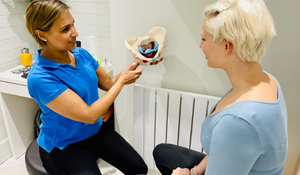Pelvic Floor Therapy to Restore Natural Function
Conducted by our women's health physiotherapists and osteopaths, pelvic floor therapy is a type of physical therapy specifically designed to treat the muscles and tissues of the pelvis.
A pelvic floor is a group of muscles, ligaments, and tissues that support the bladder, uterus, and rectum. These muscles and tissues can be weakened or damaged by pregnancy, childbirth, menopause, obesity, or other factors. As a result, typically women and men may experience incontinence, pelvic pain, or sexual dysfunction.
Pelvic floor therapy can help to strengthen and tone the muscles and tissues of the pelvis, relieving these symptoms. In addition, pelvic floor therapy can also help to improve sexual function.
Ultimately, the aim is to resolve any symptoms you may be experiencing and to prevent dysfunction, such as incontinence or prolapse, from occurring.
Regain control of your body. If you are experiencing any pelvic floor dysfunctions, book a Women Health Initial Assessment with Nordic Balance.













